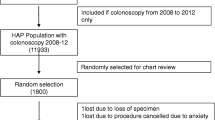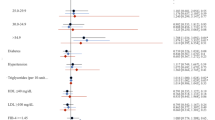Abstract
Objective
We investigated the clinical usefulness of HbA1c in screening an average-risk group <50 years of age who need colonoscopy for colorectal cancer (CRC) screening.
Methods
Eight hundred nineteen asymptomatic males who underwent colonoscopy for CRC screening with blood chemistries between January 2006 and December 2006 were enrolled. The ages of the subjects ranged from 40 to 59.
Results
Subjects in their 50 s had significantly more adenomatous polyps than subjects in their 40 s (32.7% vs. 26.0%, p < 0.05). The incidence of adenomatous polyp increased with increasing quartiles of HbA1C as follows: first quartile (19.9%, HbA1c 4.0–5.0), second quartile (27.8%, HbA1c 5.1–5.3), third quartile (32.7%, HbA1c 5.4–5.5), and fourth quartile (34.9%, HbA1c = 5.6–8.8)(p = 0.008). When combining quartile of HbA1c and age (40 s vs. 50 s) according to HbA1C levels, the odds ratio for adenomatous polyp in subjects in their 40 s with HbA1c <5.4% was significantly lower than that in subjects in their 50 s. However, the odds ratio for adenomatous polyp in subjects in their 40 s with HbA1c ≥5.4% was similar to that in subjects in their 50 s with average risk for CRC.
Conclusions
An elevated HbA1c may be useful as a clinical predictor of adenomatous polyps in male subjects <50 years of age who have average risk for CRC.
Similar content being viewed by others
Abbreviations
- HbA1c:
-
Glycosylated hemoglobin
- CRC:
-
Colorectal cancer
- DM:
-
Diabetes mellitus
References
Shonka NA, Anderson JR, Panwalkar AW, Reed EC, Steen PD, Ganti AK (2006) Effect of diabetes mellitus on the epidemiology and outcomes of colon cancer. Med Oncol 23:515–519
Chang CK, Ulrich CM (2003) Hyperinsulinaemia and hyperglycaemia: possible risk factors of colorectal cancer among diabetic patients. Diabetologia 46:595–607
Davila RE, Rajan E, Baron TH et al (2006) ASGE guideline: colorectal cancer screening and surveillance. Gastrointest Endosc 63:546–557
Ma J, Giovannucci E, Pollak M et al (2004) A prospective study of plasma C-peptide and colorectal cancer risk in men. J Natl Cancer Inst 96:546–553
Terry MB, Neugut AI, Bostick RM et al (2002) Risk factors for advanced colorectal adenomas: a pooled analysis. Cancer Epidemiol Biomarkers Prev 11:622–629
Myint PK, Sinha S, Wareham NJ et al (2007) Glycated hemoglobin and risk of stroke in people without known diabetes in the European Prospective Investigation into Cancer (EPIC)-Norfolk prospective population study: a threshold relationship? Stroke 38:271–275
Saydah SH, Platz EA, Rifai N, Pollak MN, Brancati FL, Helzlsouer KJ (2003) Association of markers of insulin and glucose control with subsequent colorectal cancer risk. Cancer Epidemiol Biomarkers Prev 12:412–418
Blake GJ, Pradhan AD, Manson JE et al (2004) Hemoglobin A1c level and future cardiovascular events among women. Arch Intern Med 164:757–761
Kaaks R, Toniolo P, Akhmedkhanov A et al (2000) Serum C-peptide, insulin-like growth factor (IGF)-I, IGF-binding proteins, and colorectal cancer risk in women. J Natl Cancer Inst 92:1592–1600
Shinchi K, Kono S, Honjo S et al (1994) Obesity and adenomatous polyps of the sigmoid colon. Jpn J Cancer Res 85:479–484
Platz EA, Hankinson SE, Rifai N, Colditz GA, Speizer FE, Giovannucci E (1999) Glycosylated hemoglobin and risk of colorectal cancer and adenoma (United States). Cancer Causes Control 10:379–386
Rundle AG, Lebwohl B, Vogel R, Levine S, Neugut AI (2008) Colonoscopic screening in average-risk individuals ages 40 to 49 vs 50 to 59 years. Gastroenterology 134:1311–1315
Imperiale TF, Kahi CJ, Stuart JS et al (2008) Risk factors for advanced sporadic colorectal neoplasia in persons younger than age 50. Cancer Detect Prev 32:33–38
Imperiale TF, Wagner DR, Lin CY, Larkin GN, Rogge JD, Ransohoff DF (2002) Results of screening colonoscopy among persons 40 to 49 years of age. N Engl J Med 346:1781–1785
Ikeda F, Doi Y, Yonemoto K et al (2009) Hyperglycemia increases risk of gastric cancer posed by Helicobacter pylori infection: a population-based cohort study. Gastroenterology 136:1234–1241
Giovannucci E (2007) Metabolic syndrome, hyperinsulinemia, and colon cancer: a review. Am J Clin Nutr 86:s836–842
Weiderpass E, Gridley G, Nyren O, Ekbom A, Persson I, Adami HO (1997) Diabetes mellitus and risk of large bowel cancer. J Natl Cancer Inst 89:660–661
Le Marchand L, Wilkens LR, Kolonel LN, Hankin JH, Lyu LC (1997) Associations of sedentary lifestyle, obesity, smoking, alcohol use, and diabetes with the risk of colorectal cancer. Cancer Res 57:4787–4794
Will JC, Galuska DA, Vinicor F, Calle EE (1998) Colorectal cancer: another complication of diabetes mellitus? Am J Epidemiol 147:816–825
O’Mara BA, Byers T, Schoenfeld E (1985) Diabetes mellitus and cancer risk: a multisite case-control study. J Chronic Dis 38:435–441
Hu FB, Manson JE, Liu S et al (1999) Prospective study of adult onset diabetes mellitus (type 2) and risk of colorectal cancer in women. J Natl Cancer Inst 91:542–547
La Vecchia C, Negri E, Decarli A, Franceschi S (1997) Diabetes mellitus and colorectal cancer risk. Cancer Epidemiol Biomarkers Prev 6:1007–1010
Tripkovic I, Tripkovic A, Ivanisevic Z, Capkun V, Zekan L (2004) Insulin increase in colon cancerogenesis: a case-control study. Arch Med Res 35:215–219
Suehiro T, Matsumata T, Shikada Y, Sugimachi K (2005) Hyperinsulinemia in patients with colorectal cancer. Hepatogastroenterology 52:76–78
Khaw KT, Wareham N, Bingham S, Luben R, Welch A, Day N (2004) Preliminary communication: glycated hemoglobin, diabetes, and incident colorectal cancer in men and women: a prospective analysis from the European prospective investigation into cancer-Norfolk study. Cancer Epidemiol Biomarkers Prev 13:915–919
Study Support
NA
Disclosure
The authors have no commercial associations that might represent a conflict of interest in relation to this manuscript.
Author information
Authors and Affiliations
Corresponding author
Rights and permissions
About this article
Cite this article
Kim, B.J., Kim, YH., Sinn, D.H. et al. Clinical usefulness of glycosylated hemoglobin as a predictor of adenomatous polyps in the colorectum of middle-aged males. Cancer Causes Control 21, 939–944 (2010). https://doi.org/10.1007/s10552-010-9543-4
Received:
Accepted:
Published:
Issue Date:
DOI: https://doi.org/10.1007/s10552-010-9543-4




